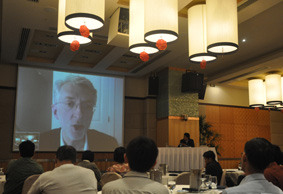by
CHERIAN GEORGE
February 28th, 2010
For Singapore journalism, the most poignant moment in the two-day conference on the future of news media may have come via Skype from Florida, when media convergence guru Jeff Jarvis responded to a question from Patrick Daniel, editor in chief of SPH’s English and Malay newspapers.
 Assuming that the downward trend in American news industry is ahead of Asia by a few years, what timely lessons could Asian media draw from the missteps of the Americans, Daniel asked.
Assuming that the downward trend in American news industry is ahead of Asia by a few years, what timely lessons could Asian media draw from the missteps of the Americans, Daniel asked.
Jarvis’ reply drew from the decline of TV Guide, once one of America’s biggest weeklies – but he could just as easily have been referring to The Straits Times and other newspapers in Asia that are still highly profitable.
American editors could see the trends, he noted, but avoided the inevitable changes because their publications were still flowing with profits. This was the problem with being a cash cow, he said: “Don’t let it blind you to the necessity of changing utterly.”
American publishers had been guilty of a kind of protectionism, he added, protecting the old business models instead of throwing them open.
The two-day conference on The Future of News Media & Journalism (25-26 February 2010) was organised by the Asia Journalism Fellowship and the industry association WAN-IFRA. Over the last year or so, the newspaper business in the US has been stunned by high-profile losses and closures, prompting extensive soul searching about where the industry and profession are headed.
In Asia, news giants continue to be make money, with Singapore Press Holdings posting operating profits of around S$400 million last year despite the recession. However, newspaper circulations here have been stagnant or in slow decline. This has prompted SPH to move aggressively into online and mobile media such as omy.sg. But SPH’s different platforms still work largely in separate silos.
Part of the conference was devoted to exploring ways to integrate different media more effectively. However, a more fundamental challenge for journalists is to redefine their role, participants heard.
“It’s not printing on paper or distributing things,” said Jarvis of where journalism’s value lay. “It’s not even information, as information is a commodity. I think it’s in relationships. … Think as a service organisation, not just the manufacturer of a product.”
Robert Niles, editor of the Online Journalism Review, agreed. “We are ultimately in the community business,” he said.
This shift will require professional journalists to become more open to collaboration with their communities, speakers said. American news organisations still thought of themselves as publishers when they should have been acting as network builders, Niles said.
Editors at the conference spoke of the opportunity to reconnect with the public. Reginald Chua, the new editor of Hong Kong’s South China Morning Post, said, “We tend to ask, what do we do, instead of asking what do people want? We really need to ask the question: what do people want.”
Bambang Harimurti, president of Indonesia’s Tempo group, said that newspapers, which once created a whole new market, were now followers. They had allowed their dependence on advertising revenue to affect their editorial independence.
“I’m not against advertisements, I just want advertisements on my terms,” he said. He hoped that as micropayment systems developed, news media could depend on readers instead.
“I would rather depend on millions of people who are willing to pay small amounts, like a few cents, because they believe in what you are doing. That to me is journalism at its best.”
While the conference heard various ideas about how news media could remain relevant and valued, nobody claimed that it would be possible to return to the years of 30-40 percent profitability. Over the long term, publishers and shareholders would have to get used to much lower margins, even in those news organisations that successfully restructured themselves.
See also: “The future of journalism in a post-newspaper world“

Be the first to comment on "News industry ponders the future at Singapore conference"